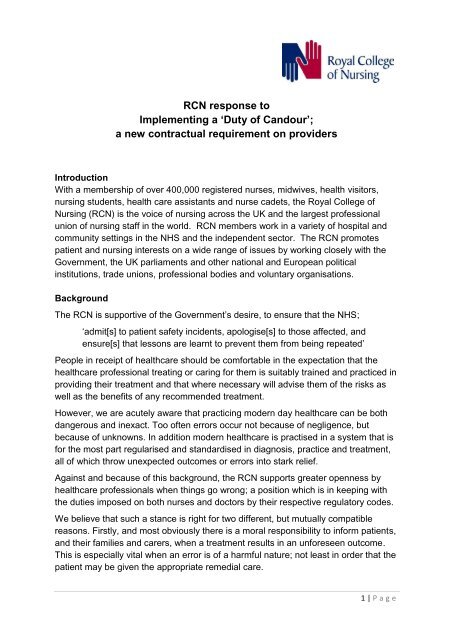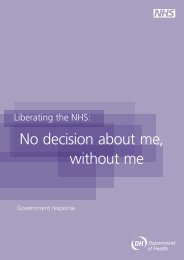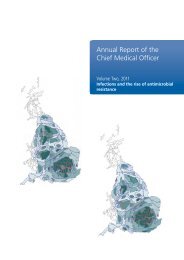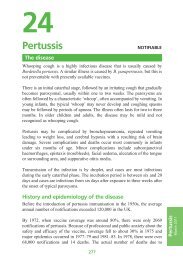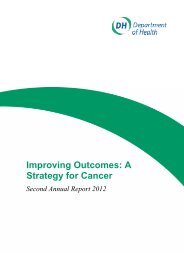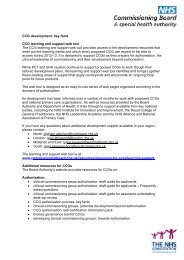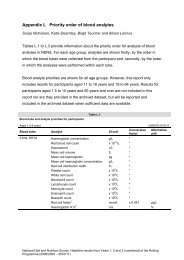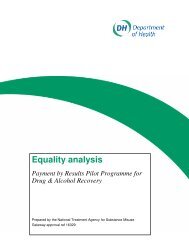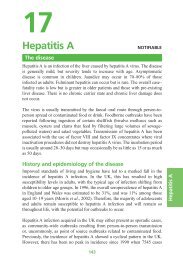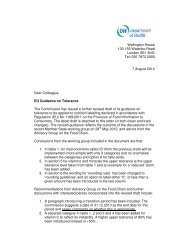RCN response to Implementing a 'Duty of Candour'; a new ...
RCN response to Implementing a 'Duty of Candour'; a new ...
RCN response to Implementing a 'Duty of Candour'; a new ...
You also want an ePaper? Increase the reach of your titles
YUMPU automatically turns print PDFs into web optimized ePapers that Google loves.
<strong>RCN</strong> <strong>response</strong> <strong>to</strong><br />
<strong>Implementing</strong> a ‘Duty <strong>of</strong> Candour’;<br />
a <strong>new</strong> contractual requirement on providers<br />
Introduction<br />
With a membership <strong>of</strong> over 400,000 registered nurses, midwives, health visi<strong>to</strong>rs,<br />
nursing students, health care assistants and nurse cadets, the Royal College <strong>of</strong><br />
Nursing (<strong>RCN</strong>) is the voice <strong>of</strong> nursing across the UK and the largest pr<strong>of</strong>essional<br />
union <strong>of</strong> nursing staff in the world. <strong>RCN</strong> members work in a variety <strong>of</strong> hospital and<br />
community settings in the NHS and the independent sec<strong>to</strong>r. The <strong>RCN</strong> promotes<br />
patient and nursing interests on a wide range <strong>of</strong> issues by working closely with the<br />
Government, the UK parliaments and other national and European political<br />
institutions, trade unions, pr<strong>of</strong>essional bodies and voluntary organisations.<br />
Background<br />
The <strong>RCN</strong> is supportive <strong>of</strong> the Government’s desire, <strong>to</strong> ensure that the NHS;<br />
‘admit[s] <strong>to</strong> patient safety incidents, apologise[s] <strong>to</strong> those affected, and<br />
ensure[s] that lessons are learnt <strong>to</strong> prevent them from being repeated’<br />
People in receipt <strong>of</strong> healthcare should be comfortable in the expectation that the<br />
healthcare pr<strong>of</strong>essional treating or caring for them is suitably trained and practiced in<br />
providing their treatment and that where necessary will advise them <strong>of</strong> the risks as<br />
well as the benefits <strong>of</strong> any recommended treatment.<br />
However, we are acutely aware that practicing modern day healthcare can be both<br />
dangerous and inexact. Too <strong>of</strong>ten errors occur not because <strong>of</strong> negligence, but<br />
because <strong>of</strong> unknowns. In addition modern healthcare is practised in a system that is<br />
for the most part regularised and standardised in diagnosis, practice and treatment,<br />
all <strong>of</strong> which throw unexpected outcomes or errors in<strong>to</strong> stark relief.<br />
Against and because <strong>of</strong> this background, the <strong>RCN</strong> supports greater openness by<br />
healthcare pr<strong>of</strong>essionals when things go wrong; a position which is in keeping with<br />
the duties imposed on both nurses and doc<strong>to</strong>rs by their respective regula<strong>to</strong>ry codes.<br />
We believe that such a stance is right for two different, but mutually compatible<br />
reasons. Firstly, and most obviously there is a moral responsibility <strong>to</strong> inform patients,<br />
and their families and carers, when a treatment results in an unforeseen outcome.<br />
This is especially vital when an error is <strong>of</strong> a harmful nature; not least in order that the<br />
patient may be given the appropriate remedial care.<br />
1 | P a g e
Secondly, and equally as important though less <strong>of</strong>ten as considered, it that it is only<br />
by acknowledging when errors have occurred that healthcare pr<strong>of</strong>essionals are able<br />
<strong>to</strong> improve their practice or that <strong>of</strong> their wider pr<strong>of</strong>ession, and their employing<br />
organisations are able <strong>to</strong> undertake any necessary systemic reviews, since most<br />
errors are systemic rather than solely the fault <strong>of</strong> an individual practitioner.<br />
It is from this later perspective that we respond <strong>to</strong> this consultation, whilst<br />
acknowledging fully the imperative for improvement on the status quo provided by<br />
the former.<br />
General Response<br />
Whilst we are supportive <strong>of</strong> the Department’s intentions, we do not believe that the<br />
proposed changes will fundamentally achieve the outcome that we all desire, that <strong>of</strong><br />
ensuring, so far as is reasonable practicable, that all treatment errors are identified<br />
and notified <strong>to</strong> patients, or their families or carers; and that changes are made <strong>to</strong><br />
clinical practice in order that such situations do not occur in the future.<br />
Unfortunately the culture that exists within and across the NHS, as identified through<br />
the Francis Reviews and the work undertaken by the NMC in developing its code for<br />
raising and escalating concerns, <strong>to</strong>o <strong>of</strong>ten militates against staff reporting where<br />
incidents occur, or errors are made. Additionally, <strong>to</strong>o many NHS systems work <strong>to</strong><br />
compound this cultural rejection <strong>of</strong> reporting, as evidenced by our recent survey<br />
which showed that many nurses are fearful <strong>of</strong> reporting when things go wrong, for<br />
fear <strong>of</strong> being blamed or ‘scape-goated 1 ’.<br />
With those concerns in mind, we are keen <strong>to</strong> work with the Department and other<br />
interested groups, and especially patient and carer organisations, <strong>to</strong> see where<br />
common agreement can be found <strong>to</strong> ensure that progress is made in both reducing<br />
errors and accidents, and that where they do occur, there is openness, honesty, and<br />
learning for improvement.<br />
Specific Points<br />
We do not feel that the proposed contractual duty <strong>of</strong> candour for healthcare<br />
providers, expressed primarily via a ‘declama<strong>to</strong>ry annual statement’, will do<br />
anything <strong>to</strong> increase the openness and transparency <strong>of</strong> healthcare provider<br />
organisations in the event <strong>of</strong> patient safety incidents. Indeed we believe that it<br />
could well be devalued if patients and staff see that it is merely a ‘<strong>to</strong>kenistic’<br />
gesture, which we believe it will become without adequate support for<br />
changes in the cultures and systems that exist across the NHS with regard <strong>to</strong><br />
reporting errors and raising concerns.<br />
1 http://www.nursingtimes.net/nursing-practice/clinical-specialisms/management/whistleblowers-being-<br />
ignored-rcn-survey-finds/5038788.article<br />
2 | P a g e
We are further concerned that the introduction <strong>of</strong> financial penalties in<strong>to</strong> any<br />
reporting system is likely <strong>to</strong> reduce the reporting <strong>of</strong> such incidents, or even<br />
increase the likelihood <strong>of</strong> blame being apportioned <strong>to</strong> individuals, which will in<br />
our opinion militate against the important need <strong>to</strong> ensure that lessons are<br />
learnt across healthcare systems.<br />
We do feel that some form <strong>of</strong> agreed procedure, <strong>to</strong> be required across all<br />
healthcare providers, would be <strong>of</strong> great benefit, and welcome the proposal for<br />
a structured approach <strong>to</strong> the investigation and reporting <strong>of</strong> incidents, as set<br />
out in section five <strong>of</strong> the consultation document.<br />
We are also supportive <strong>of</strong> the development <strong>of</strong> a clear and simple roadmap,<br />
which can be used by patients, carers and families, in the event <strong>of</strong> wanting <strong>to</strong><br />
raise a concern or lodge a complaint. We feel that this would best be<br />
developed through the Department <strong>of</strong> Health’s relationships with patient<br />
organisations, and with the support <strong>of</strong> pr<strong>of</strong>essional bodies such as the royal<br />
colleges.<br />
However, we are unsure <strong>of</strong> the viability <strong>of</strong> imposing a universal target <strong>of</strong> 5<br />
working days for the reporting <strong>of</strong> adverse incidents. This may well be a worthy<br />
objective, however it may not be practical in complex cases, and so we would<br />
welcome further discussion <strong>of</strong> this proposal, especially with representatives <strong>of</strong><br />
healthcare provider bodies, with a view <strong>to</strong> obtaining a consensually agreed<br />
timeframe which would be both manageable and in keeping with the need <strong>to</strong><br />
be seen <strong>to</strong> be responding in a timely manner.<br />
Both the ongoing Francis Inquiry and the changes that have already taken<br />
place in advance <strong>of</strong> the passage <strong>of</strong> the Health and Social Care Bill will have a<br />
dramatic impact on the structure and nature <strong>of</strong> the English NHS; not least in<br />
consequence <strong>of</strong> the loss <strong>of</strong> the National Patient Safety Agency. As such, the<br />
<strong>RCN</strong> feels that it would benefit the Government <strong>to</strong> give more thought as <strong>to</strong><br />
how the ‘<strong>new</strong>’ system, premised on the commissioning <strong>of</strong> services being<br />
undertaken primarily by clinicians, can best incorporate the need <strong>to</strong> be frank<br />
about errors and mishaps, and most importantly reducing their occurrence.<br />
MAP 26/1/2012<br />
3 | P a g e


